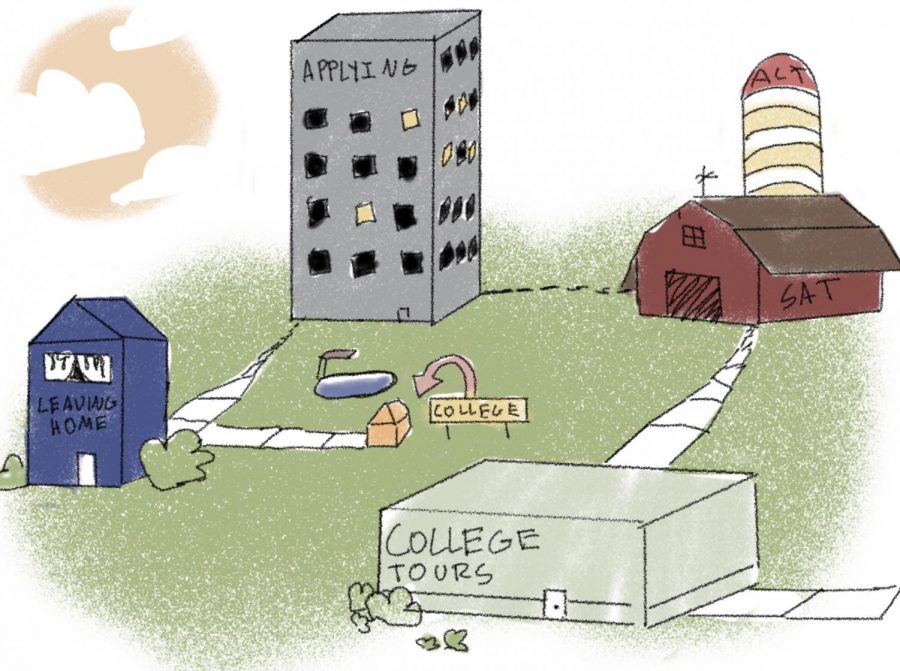Things I Wish I Knew: the College Application Process
April 30, 2021
The college application process for the CRLS Class of 2021 is finally drawing to a close, and with it ends a process that has taken eight months of sleepless nights and emotional strife. For some, the conclusion is marked by granted wishes, celebration, and excitement; however, inevitably, it will mean crushed dreams for others.
Heading into admissions season, we all have an idea of where we want to end up. We manifest, affirm, and reason with ourselves that our hopes will be realized, and if they don’t, things will be alright. But the words “we regret to inform you…” never fail to bring out something buried deep in you: despair, contempt, and even a fear that you are not the person you thought you were, that you aren’t good enough, or that you didn’t do something right. Know that these emotions are natural. After all, it’s difficult to shake the notion that hard work doesn’t equate to success, especially when the past four years of school have trained you to think that way. As a senior reflecting on my experience with college applications, I want to share some lessons I’ve learned.
An acceptance should not be treated as validation: Colleges accept your application—not you as a person. The culmination of all of your efforts throughout high school is what shapes you, not what colleges you get into; your results are for a random group of people to decide. Remember that college admissions is a crapshoot and the best you can do is to place yourself in a competitive position to get in.
Learn to love your plan B: Life almost never goes your way, and there is no shame in a plan B, or a plan C, as long as you have a plan. With that comes a warning: do not get overly attached to any one institution. Being emotionally invested in a place when there is no guarantee of admission is a recipe for disappointment.
Prestige is not everything: Of course, top schools are top schools for a reason, but many times specific programs at schools that might not be “name brand” can offer you a similar level of academic excellence. Prepare yourself the best you can, but understand that you can never prepare enough. Most importantly, it’s up to you to achieve your goals. No college on this Earth will do the work for you.
For younger students who also might be thinking about starting the process soon, here are a couple of important things to remember as you embark on your own journey:
Think about what makes you happy: What subjects in school did you genuinely enjoy? What topics could you talk for hours about? It may sound cliche, but don’t do things because you think they will help in the admissions process—they don’t. Do what you love. Your essays will be more genuine, you will be happier with where you go, and you are more likely to end up somewhere that will be a better fit for you.
Recommendations: They can make or break an application. With online school, it can be hard to connect and build relationships with your teachers. Join office hours and take time to check in with them. A bond with your teacher makes classes more fun, engaging, and rewarding. You may be surprised how much they can help you if you just take the time to reach out.
Scholarships: Even if you think you don’t qualify for financial aid, submit the FAFSA and CSS anyways. Start asking adults in your family for documents ahead of time, as these can be hard to locate. Apply, write, and apply some more. You never know what you’ll get and even if it’s $100 here and there, it all adds up.
Things have changed: If you have adults in your life that have gone through the college process, what they went through is very different than what you will go through. An increased population of high schoolers wanting to attend higher education, the importance of a degree in today’s job market, and the introduction of international students and the common application have made applying to college more difficult than ever. Coupled with COVID-19, the Classes of 2021, 2022, and likely 2023 are going to be facing a whole new game.
Use the school’s resources: Counselors, scholarship fairs, and the newsletters are there for a reason: to help you. The DYKs may seem boring, but they are full of internships, interesting information, and resources that may just be what you are looking for. Counselors exist to help, and a quick email is often better than having to deal with everything yourself. Scholarship fairs can help you craft good essays, which you can even use for college applications, and can give you valuable experience in applying for things if you haven’t gone through the process before.
For the Class of 2021, best of luck wherever you go. For the Class of 2022, it’s your time to shine.











